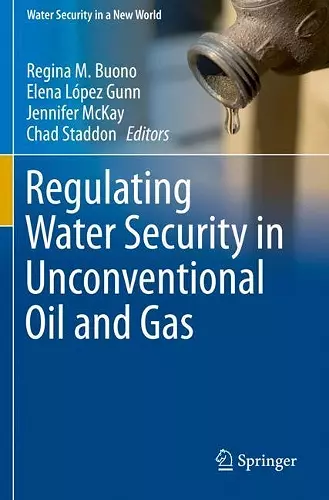Regulating Water Security in Unconventional Oil and Gas
Chad Staddon editor Elena Lopez-Gunn editor Regina M Buono editor Jennifer McKay editor
Format:Paperback
Publisher:Springer Nature Switzerland AG
Published:13th Nov '20
Currently unavailable, and unfortunately no date known when it will be back

This book addresses the need for deeper understanding of regulatory and policy regimes around the world in relation to the use of water for the production of ‘unconventional’ hydrocarbons, including shale gas, coal bed methane and tight oil, through hydraulic fracturing. Legal, policy, political and regulatory issues surrounding the use of water for hydraulic fracturing are present at every stage of operations. Operators and regulators must understand the legal, political and hydrological contexts of their surroundings, procure water for use in the fracturing and extraction processes, gain community cooperation or confront social resistance around water, collect flow back and produced water, and dispose of these wastewaters safely. By analysing and comparing different approaches to these issues from around the globe, this volume gleans insights into how policy, best practices and regulation may be developed to advance the interests of all stakeholders. While it is not always possible to easily transfer ‘good practice’ from one place to another, there is value in examining and understanding the components of different legal and regulatory regimes, as these may assist in the development of better regulatory law and policy for the rapidly growing unconventional energy sector.
The book takes an interdisciplinary approach and includes chapters looking at water-energy nexus security in general, along with issue-focused and geographically-focused case studies written by scholars from around the world.
Chapter topics, organized in conjunction with the stage of the shale gas production process upon which they touch, include the implications of hydraulic fracturing for agriculture, municipalities, and other stakeholders competing for water supplies; public opinion regarding use of water for hydraulic fracturing; potential conflicts between hydraulic fracturing and water as a human right; prevention of induced seismic activity, and the disposal or recycling of produced water. Several chapters also discuss implications of unconventional energy production for indigenous communities, particularly as regards sustainable water management.This volume will be of interest to scholars and students of energy and water, regulators and policymakers and operators interested in ensuring that they align with emergent best global practice.
ISBN: 9783030183448
Dimensions: unknown
Weight: unknown
418 pages
2020 ed.